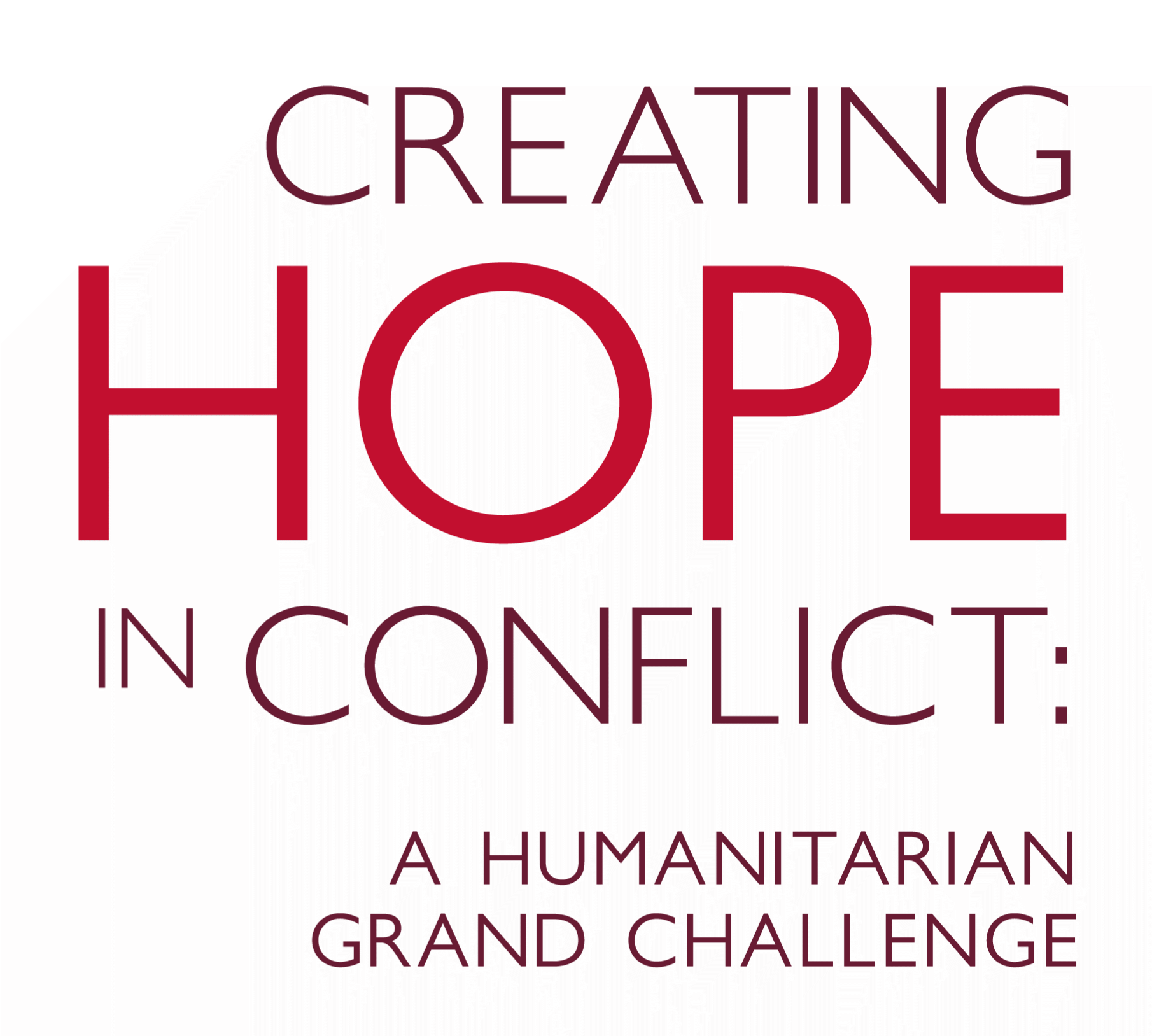Innovation Acceleration Week on energy, health, WASH and life-saving information for humanitarian crises caused by conflict. From December 9 to 13 2019.
In the Syrian conflict, a crisis in its 9th year, 6.7 million people have fled and 11.7 million people remain with humanitarian needs and protection assistance. In Yemen 24.1 million people lack access to basic essentials. Armed violence hinders delivery of life-saving assistance in the Democratic Republic of the Congo, Afghanistan and Libya. As the length, frequency, and scope of the world’s conflicts increase, humanitarian needs are growing and the humanitarian system needs to find new ways to support people affected by conflict.
Last year we invited people to submit new ideas and solutions that respond to the needs of vulnerable, inaccessible communities, through the Creating Hope in Conflict: A Humanitarian Grand Challenge program. 25 innovators were selected, and now, we invite our best to showcase their groundbreaking solutions that will significantly improve — and in many cases, save — the lives of people in conflict, at the Humanitarian Grand Challenge and the World Food Programme’s Innovation Acceleration Week.
From 9–13 December, our innovators will come together at the World Food Programme’s Innovation Accelerator in Munich, Germany. Of these bold innovations 22 are Seed projects , and 3 are Transition-to-Scale projects. Over the course of the week, humanitarian and innovation experts will help our innovators dive deep into challenges, generate solutions, and refine their project plans.
On Thursday, December 12th at 18:30 CET | 12:30 EST, a Pitch Night will take place where all innovators will be given the chance to showcase their innovations to impress investors, donors, people affected by humanitarian crises, government officials, humanitarian partners — and you!
Curious to know more about who these innovators are, and how they’re improving the lives of people impacted by and living through humanitarian conflict? Read more to find out, and learn about the conflict related problems they’re taking on:
SEED PROJECTS
OmniVis: PathVis: A water monitoring device for vibrio cholerae detection
Every year, cholera causes 5 million infections in 41 countries. In 2018, 1.2 million cholera cases were reported in Yemen. More than 2,500 people — 58% children — died in the Yemen cholera outbreak. Detecting cholera in the water can take up to 1 week, leaving populations vulnerable. This costs over $3 billion in treatment and lost productivity. OmniVis’ hardware device and disposable test kit detects for cholera in under 30 minutes in the field. Their data gathering and reporting tools provide insights on disease hotspots with earlier warning before large outbreaks occur.
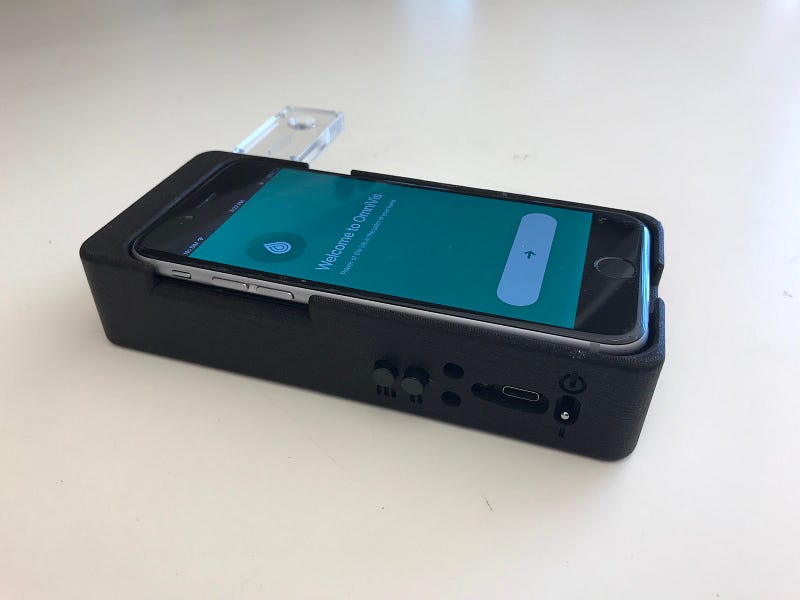
OmniVis Cholera detection device
change:WATER Labs: Portable, evaporative toilets for drop-in & distributed sanitation for displaced and urban communities
People living in extremely fragile contexts are four times as likely to lack access to safely managed sanitation, and three times as likely to practice open defecation. In conflicts, children are 20 times more likely to die from diseases linked to unsafe water and sanitation than from direct violence.Chronic under-investment into sanitation infrastructures means that people in poor and vulnerable communities live with their sewage. With no toilets or pipes, there is no way to flush. Change:WATER Labs is developing a low-cost, compact, waterless toilet for non-sewered communities. The portable toilet rapidly evaporates 95% of sewage without using any type of energy.
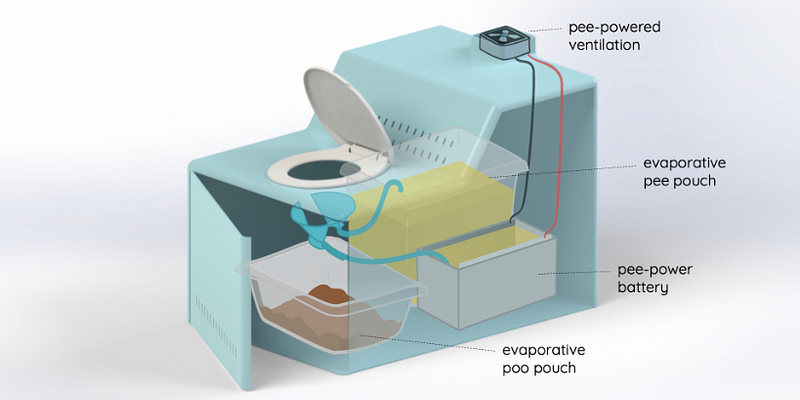
changeWATER:Labs’ iThrone
NeedsList: NeedsBot — Aggregating real-time needs from anywhere via chatbot
Presently, there is no way for local organizations to communicate real-time needs from the ground. This makes it challenging for organizations to deploy their resources efficiently, and for stakeholders to efficiently contribute supplies and services. NeedsList has developed NeedsBot, a real-time messaging system to aggregate and triage needs from the field. Aid workers are able to text in urgent supply and needs via instant messaging, which are aggregated into a secure database for interested stakeholders to meet the real-time needs of vulnerable people on the ground.

NeedsList’s real-time messaging system to aggregate and triage needs from the field
ActionAid UK: Using technology to combat violence against female refugees
Syrian refugees are extremely vulnerable, with an estimated 86% of them living below the poverty line, and many refugee women facing major barriers in accessing basic resources. Lack of information is the major barrier to the prevention and treatment of sexual and gender-based violence affecting displaced women. ActionAid UK is innovating a women-designed, low-cost, mobile platforms that targets the most at-risk women and girls. The mobile platform will provide up-to-date information on rights, services, safe spaces and access to referral services.
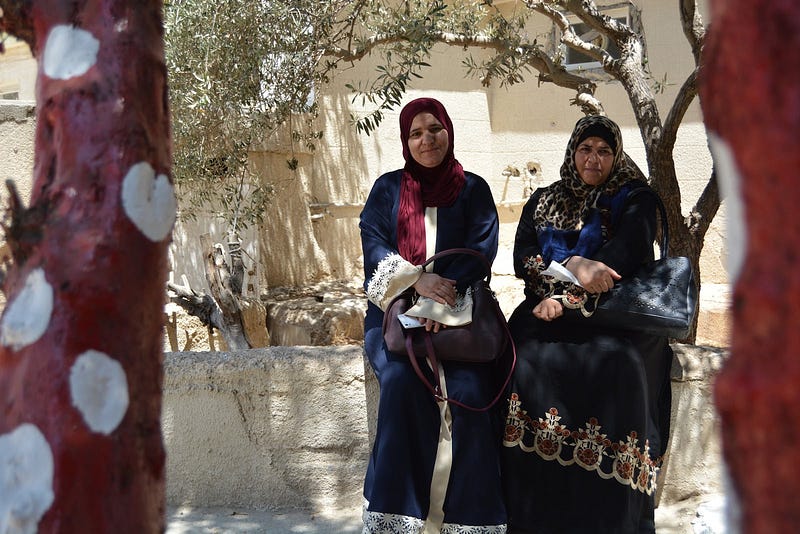
ActionAid UK is working with Syrian refugee women in Jordan, pictured above
Rainmaker Enterprise: Solar powered water pumps for regenerative agriculture in South Sudan
Conflict and climate affected regions lack reliable access to water. This contributes and drives extreme food insecurity, health challenges, forced migration, and inter-communal conflicts. In South Sudan, more than half the population lacks access to water. The Rainmaker Enterprise has invested in co-designed and locally-led solar powered water supply and management systems for off-grid communities. This drip irrigation provides clean water for human consumption and powers regenerative agriculture, year-round.
Sun Buckets: Collecting, storing, and using thermal energy by those in regions of conflict
Those living in conflict regions are often “energy poor” and don’t have access to energy for basic needs, such as cooking food, or boiling water to purify for drinking. In these desperate situations, almost any combustible material may be used as fuel, even if it is dangerous, creates harmful emissions, or deforestation. These include wood and charcoal, health damaging pollutants. Exposure to cooking pollutant is the 4th leading killer globally, many of those most affected being women and children. In conflict zones, fuel theft is often an issue. Sun Buckets, collects and stores thermal energy, enabling cooking using solar energy, without fuel, fire or emissions. The portable storage allows users to cook where and when they like, including inside and at night.
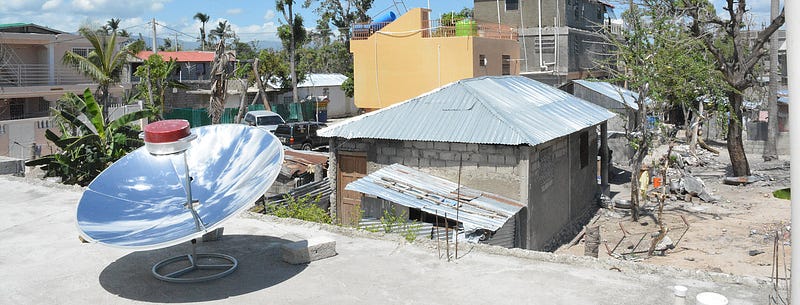
SunBuckets
Iristick: Remote healthcare assistance with smart glasses
Iristick and Memisa work to reduce maternal and infant mortality in the Democratic Republic of the Congo, by equipping midwives with smart glasses. In providing the remote hospitals with electricity using solar panels, a vSAT internet connection through satellite, and smart glasses, midwives and nurses are able to receive remote assistance from doctors with expertise to guide them through the situation.
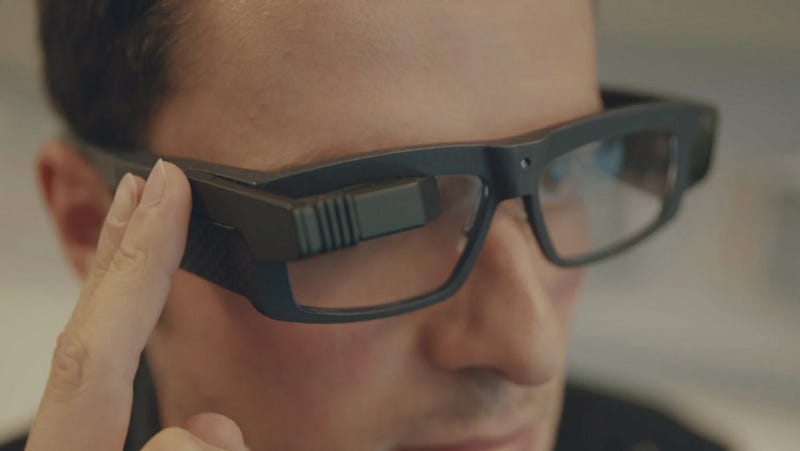
Iristick telemedicine glasses
The Johns Hopkins University: Intelehealth: A rapidly deployable telemedicine platform for delivery of essential healthcare services to internally displaced populations
There are currently 1.2 million internally displaced people residing within conflict zones of Idlib, Syria. These people face enormous gaps and challenges in accessing health care. 45% of total mortality can be attributed to non-communicable diseases . While frontline health workers are well placed to meet the health service needs, they have limited skills and training. Intelehealth, a knowledge-enabled telemedicine platform, empowers front line health workers to provide a suite a primary and specialist level health services in crisis affected areas by connecting with a network of remote doctors and specialists. Intelehealth’s rapidly deployable telemedicine platform delivers essential healthcare services.
Vatan Dernegi: Low-cost modular battery array for stable and renewable energy for health services
Maintaining electricity supply for life-saving health services is a continuous challenge in humanitarian settings where energy supplies are regularly disrupted. Renewable energy systems and backup electricity, for when diesel generators cannot be used, are prohibitively expensive and not versatile enough for humanitarian purposes. Without adequately mobile, sustainable, and low-cost options for electricity storage and supply, health facilities risk interruption to life-saving activities. WATAN is testing the suitability of a low-cost, locally-sourced, mobile, and plug-and-play energy source. The product is a casing for a battery module which, uniquely, can be opened and filled with locally-sourced refurbished car batteries.
MedMagLabs: Medicinal maggot production and maggot therapy in conflict and other compromised healthcare settings
Conflict and disaster-affected communities often lack the medical resources, to effectively care for wounds. This leads to lengthy care, permanent disability, and deaths. Effective wound care solutions are needed for such compromised healthcare environment. MedMagLabs, is developing medicinal maggot production and maggot therapy in conflict-affected communities. Using a shipping container laboratory (C-Lab) for the large-scale production of medicinal maggots, conflict-affected communities can establish and operate their own laboratories to treat wounds with highly efficacious maggot therapy.
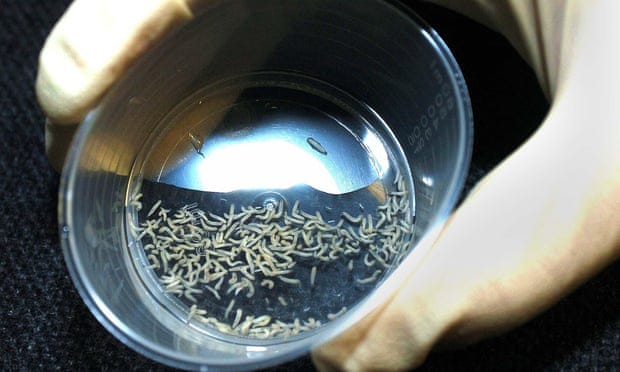
Medicinal maggots used to treat wounds
SurgiBox: The operating room in a backpack
Patients in the midst of humanitarian crises require surgical care in a safe and timely manner, often right in the field. However, humanitarian surgery exposes patients and provider teams to disproportionate risks of infection. Surgical care also demands extensive supply chains as well as large logistical footprint. Surgibox is the operating room in a backpack for safe surgery, anyplace. The ultraportable sterile field, compact enough to fit in a backpack, isolates the surgical field and surgical tray with a clear plastic barrier, accessed through arm ports designed for the highest level of surgical protective standard.
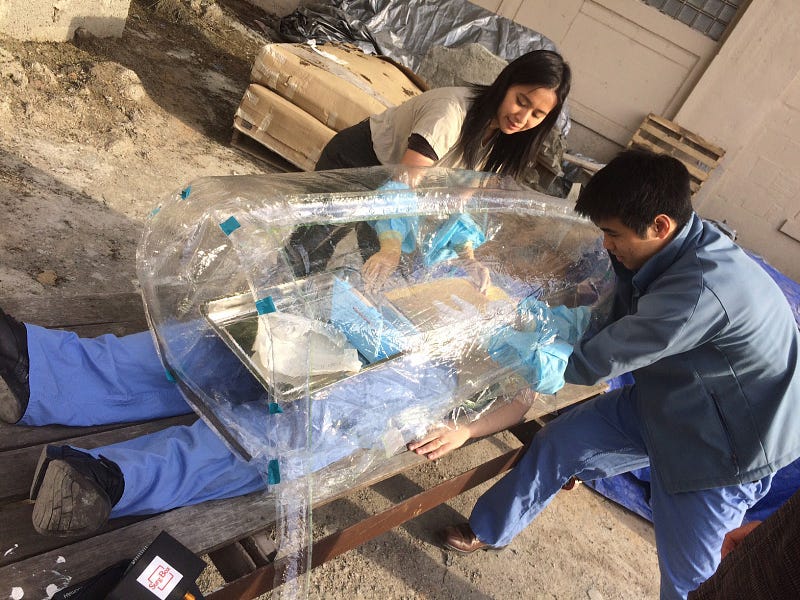
SurgiBox
Union Internationale des Organisations de Secours et Soins Meicaux: Health Integrated Resilience System (HIRS)
Health systems in conflict areas are often weakened as a result of their use of diesel for electricity in health facilities, which is often very expensive with limited supply, the fuel dependency for mobility, which is often stolen and fuels the war economy, and the shortage of qualified health professionals at all levels. The HIRS project aims to strengthen health systems in conflict zones through leveraging integrated technologies: solar, electric vehicle, and telemedicine. HIRS aims to streamline 3 technologies, using solar PV power as an alternative to fuel and diesel generators, using electric vehicles for health-mobility, and streamlining telemedicine to enable remote support.
Energy Peace Partners: The Peace Renewable Energy Credit: Unlocking renewable energy solutions in conflict settings
Leveraging climate and finance solutions to promote peace in the world’s most fragile regions, Energy Peace Partners’ climate sensitive approach expands the existing toolkit for peace and development by extending the renewable energy revolution to some of the planet’s most vulnerable populations. Energy Peace Partners is developing the Peace Renewable Energy Credit, as a new financing solution that will accelerate the transition to renewables in conflict-affected settings.
Al Seeraj: Tele-microbiology in humanitarian crises
The occurrence of difficult-to-control epidemics of infections, including hospital-acquired Gram-negative bacterial infections, and community-acquired infections such as polio, measles, tuberculosis, hepatitis and leishmaniasis, is a major threat in Syria. Maintaining clinical diagnostic services is a neglected aspect in conflict-affected settings, which is exacerbated by the catastrophic shortage of skilled medical staff. Al Seeraj is creating a telemedicine system for laboratory technology services in Syria, through tele microbiology in humanitarian crises. The system involves three workstations physically located in hard-to-reach areas of Syria, connected to a virtual headquarters abroad. Lab samples are prepared in situ in Syria, are then digitized and transmitted for remote display, interpretation, and analysis of test results by a network of laboratory technical experts.
Humanity Data Systems: HOPE and HELP: Modelling for complex humanitarian engagement
Vulnerable populations currently lack access to lifesaving information. Information flow impediments limit coordination, feedback loops and accountability. Humanity Data Systems’ modelling for complex humanitarian engagement provides state-of-the-art application of complex event processing, machine learning and modelling for the humanitarian context. This is done through HOPE (Humanitarian Operations Planning Environment) and HELP (Humanitarian Enterprise Logistics and Provisioning).
Yemen Relief and Reconstruction Foundation: Water and renewable power (WARP) systems for Yemen
Yemen is experiencing the largest cholera outbreak in recent history with over 2 million suspected cases. Over 17 million people lack access to clean water, with the Hudaydah Governorate the most impacted by cholera. The Yemen Relief and Reconstruction Foundation is installing a WARP2 System for water aid and renewable power. The WARP2 system is able to clean approximately 12 litres of water a day. This system is smaller, lighter, simpler to use, and more effective at removing biological pathogens, organic chemicals and arsenic and lead.
Comprehensive Community Based Rehabilitation in Tanzania: Mobility for all: Making prosthetics accessible through novel 3D printing technology
Thousands of people with disabilities live in three refugee camps and the surrounding communities in Kigoma, Tanzania. Faced with financial, material and human resource shortages, people in need of prosthetic limbs cannot access specialized prosthetics and orthotics services. Comprehensive Community Based Rehabilitation In Tanzania is using 3D printing technology to make high-quality, lower-body prostheses for people with disabilities in the Kigoma camps and host communities.
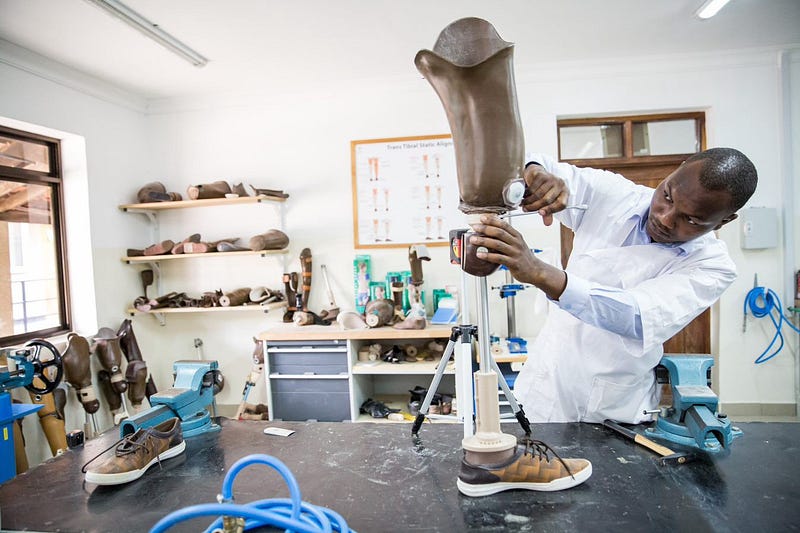
Comprehensive Community Based Rehabilitation in Tanzania creating 3D prostheses
Deutsche Welthungerhilfe: Improved food security and livelihoods for conflict affected internally displaced people through hydroponic production in ZamZam IDP camp
Due to conflict, internally displaced people living in ZamZam IDP camp in Sudan have limited access to land, water, nutritional food and income. Deutsche Welthungerhilfe e.V. is introducing hydroponic vegetable and fodder production in ZamZam camp to complement ongoing cash voucher distributions by WFP. The hydroponic production will allow for improved food security and livelihoods for displaced people
Fundacion Accion Contra El Hambre: SAM Photo Diagnosis App
Acute malnutrition remains a significant problem throughout the world. Community-based management of acute malnutrition attempts to reduce the cost of treatment while maximizing coverage through community engagement. However, the Fudación Acción Contra El Hambre aims to provide tools to communities, and enable them to take a more active role in solving the problem. Their SAM Photo Diagnosis App, a chatbot photo diagnosis platform, detects malnutrition by simply using a photo.
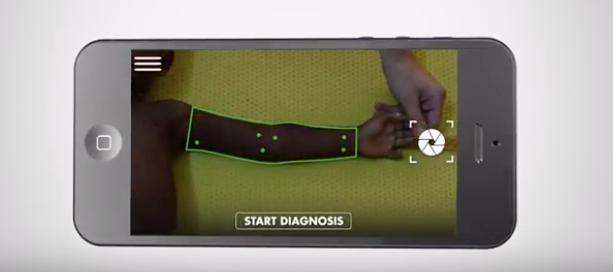
SAM Photo Diagnosis App
Murdoch Children’s Research Institute: CareNet
Children and young people with disabilities are at increased risk of illness, injury, abuse and death during humanitarian emergencies. Humanitarian actors often struggle to effectively reach people with disabilities — especially children and young people. CareNet is a child- centred, family-focused approach that recognizes the capacity of those living with disabilities in emergencies. CareNet establishes networks of support groups for children and young people with disabilities that promote peer-to-peer learning, support and communication with healthcare workers. CareNet aims to improve self-care, health services access, and ultimately to enable children and young people to survive and thrive.
Johns Hopkins University Centre for Humanitarian Health: mHealth for Improving Non-Communicable Disease Management in the Syria Crisis
Access to health services and the quality of services are major concerns in conflict settings where the destruction of health facilities and the loss of health professionals have severely limited capacities. The MIT Sana mHealth application is tablet-based application for diabetes and hypertension care. The application incorporates disease management guidelines and patient data which serve as the basis for a decision support tool that promotes adherence to medical guidelines and quality of care. Patient-focused outputs take the form of text messages and printed visit summaries. These tools enhance disease knowledge, health behaviour, and the continuity of care across providers, especially when heath care access is disrupted by conflict and displacement.
Dahdaleh Institute for Global Health Research, York University: Machine Learning Enabled Safe Water Optimization Tool for Humanitarian Response
Waterborne diseases are among the primary threats facing people affected by conflict, including those living in displacement camps, and where health infrastructures have been destroyed. Providing safe water is essential for limiting morbidity and mortality associated with waterborne diseases. Current guideline protocols for emergency water treatment are remarkably not based on field evidence, and often fail to ensure that water is safe to drink in emergency settings. This project aims to build a novel safe water optimization tool, that leverages cloud computing and artificial intelligence to learn from the water quality monitoring data that humanitarian agencies already routinely collect for reporting purposes. Field workers will upload this routine data to a web-based platform in order to generate customized water chlorination instructions that are evidence-based, site-specific, and to demonstrably ensure that water is safe to drink, for any field site around the world.
TRANSITION TO SCALE PROJECTS
Hala Systems: Scaling Sentry: An early warning detection system to save lives
Hala Systems develops advanced solutions for civilian protection, preventing violence before, during, and after conflict. Sentry Syria, their indication and warning system, uses artificial intelligence to identify and predict threats. Sentry then sends an early warning notification to civilians 7–10 minutes ahead of an incoming airstrike, to save lives, document evidence of war crimes, and counter disinformation with credible ground truth in real time. This life-saving technology will improve, and in many cases save, the lives of people living in conflict.
Humanitarian OpenStreetMap Team: Missing Maps inAfrica’s Great Lakes region*
Humanitarian OpenStreetMap Team (HOT) is an international team dedicated to humanitarian action and community development through open mapping. With millions of people living in unmapped areas of the Democratic Republic of the Congo, the HOT team will be focusing on mapping the region to provide accurate maps of the region and help healthcare workers in their tracking, treatment, and prevention of Ebola.
Field Ready: Making essential items Field Ready*
Affected populations and the aid workers that serve them do not have exactly what they need, where and when they need it. Relief supplies and other essential items are too often unavailable or trapped in slow and expensive supply chains. As a result, lives are lost and suffering goes unaddressed. Field Ready is localizing the manufacturing of essential relief and reconstruction items. This networked and distributed way of working cuts across sectors and increases local resiliency.
Follow each project’s progress at the Innovation Accelerator Week from 9–13 December on Twitter (@HumanitarianGC and @WFPInnovation), and please join us online Thursday December 12 to watch our innovators pitch their bold solutions live!
*Finalists; shortlisted for funding.
Creating Hope in Conflict: A Humanitarian Grand Challenge is a partnership of the U.S. Agency for International Development (USAID), the U.K. Department for International Development (DFID), the Ministry of Foreign Affairs of the Netherlands, with support from Grand Challenges Canada.
The WFP Innovation Accelerator sources, supports and scales bold new solutions to end hunger. Based in Munich, Germany, the Innovation Accelerator supports WFP employees, entrepreneurs and start-ups with funding, hands-on support and access to WFP’s global operations. Through the Innovation Accelerator, WFP is leveraging unprecedented advances in digital innovation — such as mobile technology, artificial intelligence, big data and blockchain — to transform the way it serves vulnerable communities across the world.
